For more information:
Email UsWe all are impacted by, and reap the benefits of, medical research discoveries. From over-the-counter drugs, to healthcare policies and educational interventions, many of these advancements are a result of incredible feats, decades of work, and sometimes serendipitous events. Join us as we sit down with Harvard researchers to discuss these captivating behind-the-scenes stories of research.
September 23, 2020
On the Frontlines
“Phase 1 clinical trial is the first step when you’re translating a discovery in the lab to humans,” says Katy Stephenson, MD, MPH, director of the Center of Virology and Vaccine Research Clinical Trials Unit at Beth Israel Deaconess Medical Center. Stephenson discusses her past work in clinical trials and her team’s current involvement in a clinical trial for a COVID-19 vaccine.
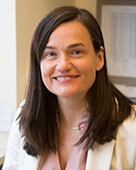
Katy Stephenson, MD, MPH, is director of the Center for Virology and Vaccine Research Clinical Trials Unit at Beth Israel Deaconess Medical Center. Stephenson is a physician-scientist who specializes in infectious diseases and immunology. The goal of her research is to develop novel biomedical interventions to prevent and treat HIV and emerging infectious diseases such as Zika virus and COVID-19.
September 9, 2020
COVID-19: Research, Action, and What’s Next
“There are still mysteries out there that we need to understand,” says Yonatan Grad, MD, PhD, assistant professor of immunology and infectious diseases at Harvard T.H. Chan School of Public Health, on his work addressing the spread of COVID-19 and possible interventions to help combat this pandemic.
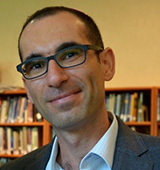
Yonatan Grad, MD, PhD, is an assistant professor in the Department of Immunology and Infectious Diseases at the Harvard T.H. Chan School of Public Health (HSPH), and an attending physician in the Division of Infectious Diseases at Brigham and Women’s Hospital (BWH). Using a combination of genomics, microbiology, mathematical modeling, and epidemiological tools, his lab investigates how pathogens evolve and spread. In collaboration with hospitals and public health institutions, his projects include studying outbreaks, as well as the biology and epidemiology that underlies the emergence and spread of antibiotic resistance. He earned his MD and PhD at Harvard Medical School, trained in internal medicine at BWH, and in infectious diseases at BWH and Massachusetts General Hospital. He completed his research fellowship at the Center for Communicable Disease Dynamics at HSPH with Marc Lipsitch.
August 26, 2020
Target Discovery for Life-Saving Treatment
“There is no drug therapy to prevent or treat calcific aortic valve disease, ” says Elena Aikawa, director of the Vascular Biology Program at the Center for Interdisciplinary Cardiovascular Science. Aikawa discusses her research on developing new therapies to treat this disease.
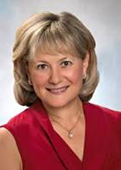
Elena Aikawa, MD, PhD, is professor of medicine at Harvard Medical School, director of the Vascular Biology Program at the Center for Interdisciplinary Sciences, founding director of the Heart Valve Translational Research Program, and associate head of section of Cardiovascular Life Sciences at Brigham and Women’s Hospital. She holds editorial positions at Circulation Research, Journal of Extracellular Vesicles, PLoS ONE, and Arteriosclerosis Thrombosis and Vascular Biology. Aikawa’s research focuses on the development of new therapies to prevent, treat, and cure calcific aortic valve stenosis.
August 12, 2020
Team Science and Genomics
“Team science is more important than it ever has been, and we’re trying to make a difference in this really challenging time,” says Jane Wilkinson, senior director of the Genomics Platform in alliance and project management at the Broad Institute. Wilkinson discusses her career studying genomics and the Broad’s work to aid in COVID-19 research and testing.
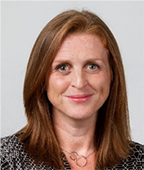
Jane Wilkinson is senior director of alliance and project management of the Genomics Platform at the Broad Institute, where she manages the platform’s external collaborations and alliances. Wilkinson has over 20 years of high-throughput genomics experience from the Wellcome Trust Sanger Genome Center where she was a key leader on the Human Genome Project, and at Monsanto Company where she led a new directive in plant genomics. During her time at the Broad, she has worked on various genomic initiatives including cancer, mendelian, and infectious and common diseases.
July 29, 2020
Assessing Vision for Real Life Impact
“Virtual reality is very effective because we can create these scenarios that simulate real world situations,” says Lotfi Merabet, OD, PhD, MPH, of Massachusetts Eye and Ear. Lotfi discusses his recent pilot grant from Harvard Catalyst to improve outcomes for patients with cerebral adrenoleukodystrophy (cALD) and work using virtual reality and brain imaging techniques to improve detection.

Lotfi Merabet, OD, PhD, is a clinician-scientist who is investigating how the brain adapts to visual impairment. He is director of the Laboratory for Visual Neuroplasticity at Massachusetts Eye and Ear and Schepens Eye Research Institute. He is staff optometrist in the vision rehabilitation service at Massachusetts Eye and Ear and associate professor of ophthalmology at Harvard Medical School.
July 15, 2020
Sleep Interrupted: Research in the time of COVID-19
“Can we use improving sleep to improve blood pressure?” asks Janet Mullington, program director of the Clinical Research Center at Beth Israel Deaconess Medical Center. Mullington discusses her work evaluating whether sleep behavioral interventions help reduce blood pressure and the effects of COVID-19 on her research.
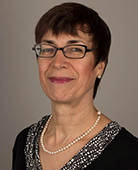
Janet Mullington, PhD, is the program director of the Clinical Research Center at Beth Israel Deaconess Medical Center (BIDMC), and professor of neurology at Harvard Medical School. Mullington has a national and international reputation of excellence in the area of the role of sleep in human health and disease, with a focus on inflammation and host defenses. She also works to better understand the impact of sleep on cardiovascular, endocrine, and neurobehavioral function.
June 24, 2020
Dream Big: Making Change in Medicine and Policy
“We need to empower not just future physicians, but all individuals in our society to understand that we can use our voice to make a change,” says Isaiah Cochran, MD, of Halifax Health. Cochran discusses his past experience as a Harvard Catalyst intern, describes his work in health policy and politics, and shares his career aspirations as he begins his residency in family medicine.

Isaiah A. Cochran, MD, is a resident physician in family medicine at Halifax Health and immediate past national president and chair of the board of trustees for the American Medical Student Association. Cochran went to undergrad at Waynesburg University in Pennsylvania, and attended medical school at the Wright State University Boonshoft School of Medicine, where he graduated in 2019. Cochran’s interests lie in the politics of medicine. He hopes to use his developing knowledge as a family medicine physician to fight for equity, equality, and justice for individuals in and outside of healthcare, and perhaps one day seek public office.
June 10, 2020
Mentorship in the Student Internship Experience
“The aim is to give opportunities to students who normally wouldn’t have these kinds of opportunities,” explains Alex Lin, PhD, director of the Center for Clinical Spectroscopy at Brigham and Women’s Hospital. Lin discusses his role as a mentor in the Harvard Catalyst Visiting Research Internship Program (VRIP) and the importance of mentor-mentee relationships.
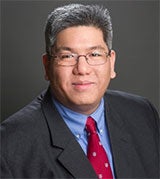
Alexander P. Lin, PhD, is director of the Center for Clinical Spectroscopy in the department of radiology at Brigham and Women’s Hospital (BWH) and assistant professor of radiology at Harvard Medical School. He is also an investigator at the Psychiatric Neuroimaging Laboratory at BWH, visiting research associate at the Center of MR Research at the University of Illinois Chicago, and is affiliated with Massachusetts General Hospital and Boston Children’s Hospital. His research focuses on translating magnetic resonance spectroscopy to the clinic, with an emphasis on traumatic brain injury.

